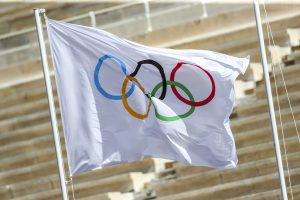The International Olympic Committee (IOC) and the Japanese government are making final preparations to hold the Tokyo Olympics even as Japan battles a surge in COVID-19 infections.
Many people in Japan aren’t happy that the Games are going ahead. Under the current state of emergency, Tokyo has logged a seven-day average of 537 new daily COVID-19 infections. While that figure has dipped slightly from one week ago, multiple public opinion polls show that 80 percent of Japanese people support either cancelling or delaying the Games.
The Tokyo Olympics were originally slated for July and August of 2020, but were postponed due to the global spread of the coronavirus. One year on and Japan is grappling with a “fourth wave” of infections. The state of emergency (SOE) in Tokyo has now been extended until June 20, just a month before the capital is due to host the delayed Olympics. Prime Minister Suga Yoshihide has said that the next three weeks will be key to stopping the spread of coronavirus.
With barely 5 percent of the population in Japan vaccinated, there are worries about how authorities will be able to manage the spread of coronavirus in the capital in tandem with preventing an outbreak at the Tokyo Olympics.
With 50 days until the opening of the Tokyo Olympics, the chairman of the Japanese Olympic Committee (JOC), Yasuhiro Yamashita, acknowledged public anxiety at a regular press conference. He reiterated that the Olympics can be held “safely and securely” and that public anxieties could be eased “by explaining the COVID-19 countermeasures more thoroughly.”
Some medical groups have expressed public health concerns and pointed to the growing strain on Japan’s medical system. Last week, Ueyama Naoto, the head of the Japanese Doctors Union, told reporters that inviting tens of thousands of athletes and officials from over 200 countries could lead to the emergence of an “Olympic” variant of COVID-19. The Tokyo Doctors Association has also warned that Tokyo will need to reduce new daily cases to under 100 in order to prevent a huge rebound of cases.
Last month, intensifying public opposition sparked an anti-Olympic online petition that has gained over 416,000 signatures to date. The Japanese lawyer behind the petition is calling on the Tokyo governor to call off the Games, arguing that protecting the lives of locals should be a priority. Even an Olympics sponsor, the Asahi Shimbun, a major daily newspaper, is also calling on the government to cancel the tournament in consideration of the health of the nation.
In addition, Japan’s National Broadcaster NHK reported that some 10,000 people out of the 80,000 who signed up to volunteer at the Tokyo Olympics have quit, a pattern that emerged following the sexist remarks made by Mori Yoshiro, then the president of the Tokyo Olympics Organizing Committee, in February.
Tokyo Governor Koike Yuriko says the city will do its best to push for a “safe and secure management” of the Olympics, despite previous rumors that Koike would announce the cancellation of the event.
Japan’s Olympics Minister Hashimoto Seiko, who is also Mori’s replacement, is making repeated efforts to quell public fears. In her regular press briefing she said the government is determined to put on a “safe and secure Olympic Games” and emphasized that the number one priority is the safety of Japanese residents and making sure that infections don’t spread.
Japan’s countermeasures include strict border controls, daily COVID-19 tests for Olympics participants, and books that illustrate what athletes are allowed to do in their bubbles and what they won’t be allowed to do, such as mixing with other athletes and the Japanese population. Fans from overseas also won’t be allowed to attend the Games, but a decision on domestic spectators and whether there will be a cap on numbers will be decided after the SOE is lifted.
The spread of the highly contagious Delta strain of COVID-19, first detected in India, is a major concern. Hashimoto stressed that athletes from Nepal, Pakistan, Sri Lanka, India, Maldives, and Bangladesh will all be vaccinated prior to arriving in Japan.
The IOC says they are prepared to send “additional medical personnel” as a part of efforts to deal with the coronavirus pandemic and confirmed that the Olympic Games could be held under a state of emergency in Japan.
































